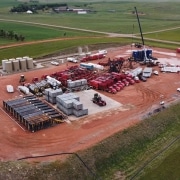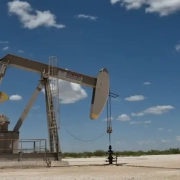The information provided on this page is for general informational purposes only and does not constitute legal, financial, or investment advice. Oil and gas laws, mineral rights regulations, and royalty structures vary significantly by state and jurisdiction. While we strive to provide accurate and up-to-date information, no guarantee is made to that effect, and laws may have changed since publication.
You should consult with a licensed attorney specializing in oil and gas law in your jurisdiction, a qualified financial advisor, or other appropriate professionals before making any decisions based on this material. Neither the author nor the publisher assumes any liability for actions taken in reliance upon the information contained herein.
Blockchain technology has emerged as a transformative force in various industries, offering unparalleled transparency, security, and efficiency in data management. In the oil and gas sector, blockchain holds immense potential for revolutionizing the way royalties are tracked and managed. By leveraging blockchain-based solutions, stakeholders can streamline royalty payments, mitigate disputes, and enhance trust in the complex ecosystem of oil and gas production. In this comprehensive article, we explore the role of blockchain in tracking oil and gas royalties and its implications for industry stakeholders.
Understanding Blockchain Technology
At its core, blockchain is a decentralized, distributed ledger technology that records transactions across multiple nodes in a secure and immutable manner. Each block in the blockchain contains a timestamped record of transactions, cryptographically linked to the previous block, creating a chain of blocks that cannot be altered retroactively. This tamper-resistant nature of blockchain ensures data integrity and transparency, making it ideal for applications requiring trust and accountability.
Challenges in Royalty Management in the Oil and Gas Industry
The oil and gas industry operates within a complex network of stakeholders, including operators, landowners, investors, and regulatory agencies. Royalty payments, which represent the compensation owed to mineral rights owners for the extraction of oil and gas from their properties, are subject to various challenges, including:
- Manual Processes: Traditional royalty management systems rely on manual processes. More oever on paper-based records, and disparate databases. This leads to inefficiencies, errors, and delays in payment processing.
- Data Fragmentation: Royalty data is often fragmented across multiple parties and systems. It makes it difficult to track, reconcile, and audit royalty payments accurately.
- Disputes and Non-Compliance: Discrepancies in royalty calculations, reporting inaccuracies, and contractual disputes can lead to conflicts. It is between operators and mineral rights owners, resulting in costly litigation and regulatory non-compliance.
Role of Blockchain in Royalty Tracking
Blockchain technology offers several key capabilities that address the challenges associated with royalty tracking in the oil and gas industry:
Immutable Record-Keeping: Blockchain provides a tamper-resistant record of royalty transactions, ensuring data integrity and transparency. Each royalty payment is recorded as a transaction on the blockchain. It is creating an immutable audit trail that can be accessed and verified by all relevant parties.
Smart Contracts: Smart contracts are self-executing agreements coded on the blockchain. It is automating the execution of contractual terms and conditions. In the context of royalty payments, smart contracts can automate payment calculations, distribution, and reconciliation. This is based on predefined rules, eliminating the need for intermediaries and reducing the risk of errors and disputes.
Transparency and Accountability: Blockchain enables real-time visibility into royalty transactions, allowing stakeholders to track the flow of funds and verify payment accuracy. By providing a transparent and auditable record of transactions, blockchain enhances trust and accountability among operators, landowners, and regulatory authorities.
Streamlined Settlements: Blockchain facilitates faster and more efficient settlement of royalty payments by eliminating intermediaries, reducing processing times, and lowering transaction costs. With blockchain-based royalty tracking systems, operators can streamline payment workflows, improve cash flow management, and enhance overall operational efficiency.
Enhanced Security: Blockchain employs cryptographic techniques to secure data integrity and protect against unauthorized access or tampering. By encrypting royalty transactions and storing them across multiple nodes in the network, blockchain mitigates the risk of fraud, cyber attacks, and data breaches, safeguarding sensitive royalty data.
Implementation Considerations and Challenges
While the potential benefits of blockchain in royalty tracking are significant, implementing blockchain-based solutions in the oil and gas industry presents several considerations and challenges:
- Integration with Existing Systems: Integrating blockchain with legacy systems and industry standards poses technical challenges. It is requiring careful planning, collaboration, and interoperability testing.
- Regulatory Compliance: Ensuring compliance with existing regulatory frameworks and data privacy laws is essential. Implementing blockchain solutions in the highly regulated oil and gas industry.
- Scalability and Performance: Scalability and performance limitations of blockchain networks. This includes transaction throughput and latency, may impact the adoption and effectiveness of blockchain-based royalty tracking systems.
- Industry Collaboration: Successful implementation of blockchain in royalty tracking requires collaboration among industry stakeholders, including operators, landowners, technology providers, and regulatory agencies, to establish common standards, governance models, and data sharing protocols.
Case Studies and Pilot Projects
Several companies and consortia in the oil and gas industry have already initiated blockchain-based pilot projects. They have proof-of-concept initiatives to explore the potential of blockchain in royalty tracking:
Petroteq Energy Inc.: Petroteq Energy, a Canadian oil sands mining company, announced a partnership with PermianChain Technologies. The will develop a blockchain-based platform for tracking oil and gas production and royalty payments.
Ondiflo: Ondiflo, a blockchain startup, is collaborating with Chevron and Schlumberger. They will pilot a blockchain solution for automating and digitizing field operations. This includes royalty management, in the Permian Basin.
The OOC Oil & Gas Blockchain Consortium: The OOC Oil & Gas Blockchain Consortium, is comprised of major oil and gas companies such as Chevron, ExxonMobil, and Shell. It is exploring blockchain technology for various use cases, including royalty tracking, supply chain management, and trading.
Blockchain technology has the potential to transform royalty tracking in the oil and gas industry. It is offering transparency, efficiency, and trust in the management of royalty payments. By leveraging blockchain-based solutions, industry stakeholders can streamline payment processes, reduce disputes, and enhance collaboration across the value chain. However, successful implementation of blockchain in royalty tracking requires careful planning, collaboration, and regulatory compliance. Blockchain has the power to revolutionize royalty management. It will drive greater efficiency and transparency in the dynamic landscape of the oil and gas sector.
If you have further questions related to the Role of blockchain in tracking oil and gas royalties, reach out here.











